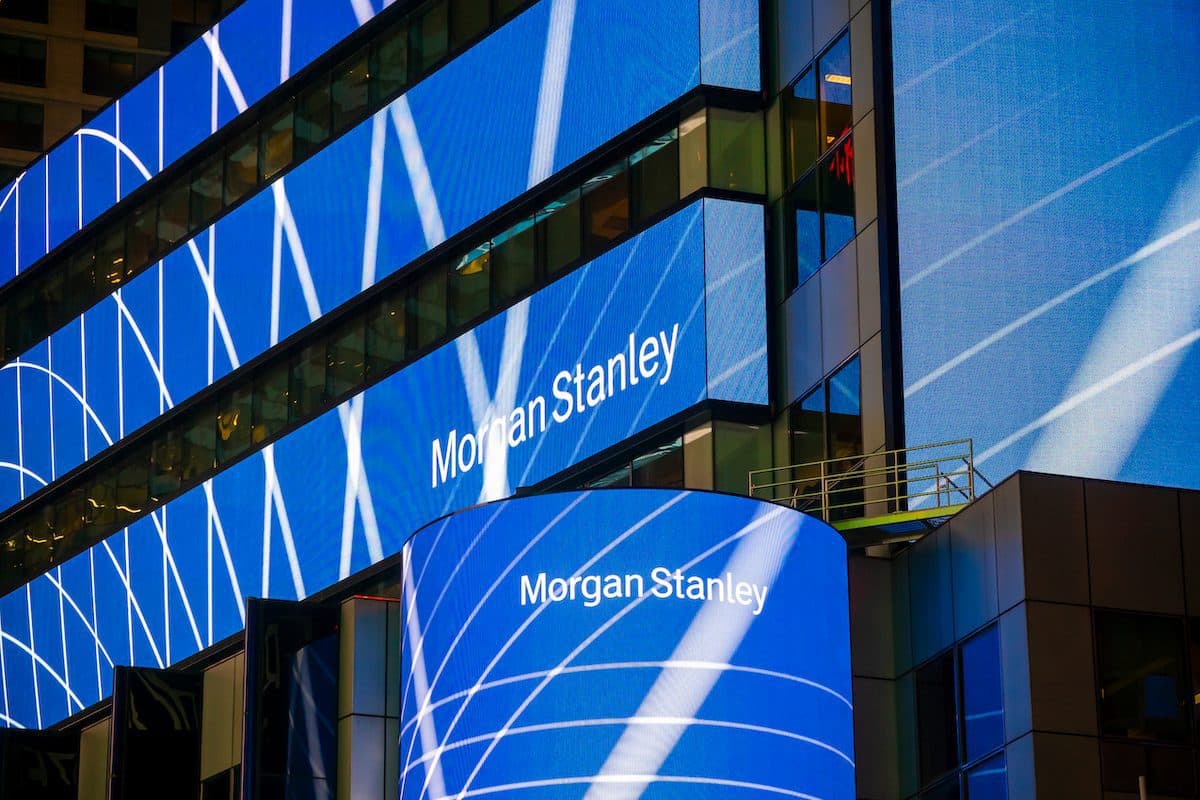Morgan Stanley’s Rumored Bithumb Play Shows Institutional Interest in Korea’s Digital Asset Infrastructure
Interest in digital assets infrastructure from legacy financial services comes as a new set of anti-money laundering and tax laws in Korea requires exchanges to partner with traditional banks.

Source: Shutterstock
- A report by Korean internet giant Naver confirmed an investment in Seoul-based Bithumb by Morgan Stanley
- Industry insiders say institutional interest in digital asset infrastructure providers has accelerated as regulations will soon require legacy financial participation in the space.
Reports that Morgan Stanley is making a play for a stake in Bithumb, Korea’s largest digital assets exchange, are part of a “continued interest” in Korean digital asset infrastructure providers by legacy financial services institutions according to industry insiders.
Naver, a Korean search engine and media company similar to Yahoo, reported Friday that earlier rumors of Morgan Stanley’s interest in Bithumb had legs and the bank is making an investment in the company. Citing anonymous sources, Naver said that Morgan Stanley was planning to invest between $254 million to $441 million (300 and 500 billion Korean won) in the exchange.
“There is continued interest from the financial services industry in the Korean crypto infrastructure providers. Korea has historically been and continues to be one of the major hubs of crypto innovation and trading,” Sang Lee, president of VegaX, a Seoul-based digital asset management company, told Blockworks. “We are seeing a refreshed interest from both the retail and institutional markets which will make Korean crypto infrastructure providers that much more important.”
New exchange partnership requirements
Lee explained to Blockworks that the increased interest in digital assets infrastructure from legacy financial services comes as a new set of anti-money laundering and tax laws in Korea regarding maintaining fiat onramps requires exchanges to partner with traditional banks and register their clients with an account at said bank. This is both to verify the client’s identity for anti-money laundering and tax reporting reasons.
“The Korean crypto market is huge enough to interest global institutions,” added Simon Seojoon Kim, CEO of Korean blockchain venture fund Hashed. “Excluding the closed Chinese market, it is the second largest market after the US. Bithumb and Upbit are the top two Korean crypto exchanges and making tons of money these days.”
As there are no listed or publicly available closed-end funds in Korea, local investors tend to access digital assets primarily through exchanges, said VegaX’s Lee.
Kim added that a number of local Korean banks, including KB Bank, the largest bank in Korea, are getting into the digital asset business — partially because this change in law requires participation from the legacy financial industry. Kim said that KB Bank co-founded a crypto custody business with Hashed last year.
The tax man cometh
To put it mildly, South Korea is in the middle of the mother of all bull markets when it comes to bitcoin and digital assets — and tax authorities want their cut.
Recently, local financial news outlet Hankyung reported that the combined volume of the four major digital asset exchanges in the country — Upbit, Bithumb, Coinone and Kobit— is $14.6 billion surpassing the local stock indexcalled KOSPI’s volume of $14.5 billion.
Hankyung cited both local currency devaluation (used as a trade war tool to make Korean exports more competitive against Trump-era tariffs and a devaluing Chinese RMB) and fears about US inflation as reasons for the accelerating interest in digital assets.
All this hasn’t gone unnoticed by the tax man. Earlier this year tax authorities in the country announced that Korean investors that make more than $2,260 (2.5 million won) in gains on the market will be subject to a 20% tax, and all digital assets valued over $442,088 (500 million won) that aren’t stored with Korean exchanges must be reported.
Local media reported that tax authorities are “struggling” to deal with the complexity of taxing the digital assets market with its long list of digital protocols, assets and investment vehicles. At the same time, digital assets investors are reportedly complaining about the higher tax rate when compared to capital gains from securities.
However Hashed’s Kim doesn’t think the new tax will seriously impede the market. “It’s still hard to imagine if this would be a way to track or effectively tax all DeFi activity,” he said.
Considering the confluence of factors at play in Korea, including a bull market, financial regulation requiring legacy bank participation, and fear of missing out, Morgan Stanley’s potential Bithumb buy is another way for the bank to enter an expanding industry. Just this week, the bank said that it would offer bitcoin exposure to its wealthiest clients via three funds.
Earlier this month, Morgan Stanley was among a number of institutions that led a $200 million round of funding for NYDIG, Stone Ridge Asset Management’s digital assets vertical. In January, it boosted its stake in Microstrategy, by about 650,000 shares, as the price of bitcoin broke $40,000 for the first time.






